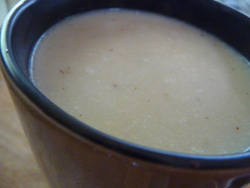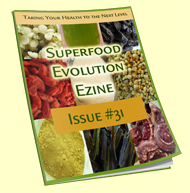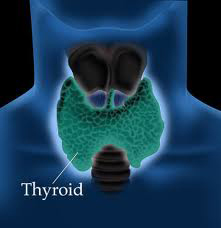| Back to Back Issues Page |
 |
|
Optimal Thyroid Health Using Superfoods -- #31 October 27, 2012 |
~~~~~~~~~~~~~~~~~~~~~~~
IN THIS ISSUE
~~~~~~~~~~~~~~~~~~~~~~~~
What is the Thyroid Gland?Here in this month's ezine we will cover one of the most fascinating glands in the human body, the thyroid. Before we discuss the foods/supplements that we have come to consider superior for rejuvenating this vital part of the endocrine system, we will first begin by briefly summarizing exactly what the thyroid is and why it is so important to overall health.
The thyroid gland is part of the endocrine system and is the soft, butterfly-shaped tissue located in the throat chakra just below the Adam's apple. The name "thyroid" comes from the Greek word meaning "shield", which indicates one of its major protective functions against harmful toxic substances. Main Thyroid Gland Functions The thyroid gland is in charge of making the primary metabolic hormones that are responsible for many essential functions in the body. It is part of the endocrine system and a whole network of other glands. Interacting with other hormones such as estrogen, progesterone, testosterone as well as cortisol and insulin, a healthy balance of thyroid hormones is necessary for proper endocrine equilibrium. The thyroid is responsible for producing three different types of hormones. These include:
The two main glands that work directly with the thyroid are the pituitary gland and the hypothalamus gland, both which assist in the production of hormones that stimulate and normalize T3/T4 hormones. While much of how these three thyroid hormones operate is still being analyzed in current scientific research, most studies agree that about 90% of the hormones produced are in the inactive form of T4, which the liver converts to the active form of T3. The appropriate amounts of T4 and T3 ensure proper metabolism. Both T3 and T4 are synthesized from tyrosine, an amino acid and iodine. The thyroid regulates the metabolic energy of the body, controlling a fast or slow metabolism and the ability to burn calories. It is a "finely tuned sensor" responsible for the growth and function rate of many other systems in the body. It is essential for activating "Jing", one of the 3 treasures in Traditional Chinese Medicine considered to be the "root of our vitality." When the thyroid gland is compromised it can cause a number of symptoms including: hormone imbalance, autoimmune diseases, chronic nervous disorders, fatigue, weight gain issues, fluctuations in body temperature and the inability to express oneself creatively. What is Hypothyroidism? A majority of the people with thyroid imbalance have an underactive thyroid (hypothyroid), whereby not enough hormones are being produced. Women are largely affected with statistics at about 75% for women and 25% for men. Some people have a body type that is prone to hyperthyroid, the opposite of hypothyroid, in which too much thyroid hormone is produced, but this is not as common. Hypothyroidism causes a slowing of metabolism and burning of calories. It influences one's ability to digest and eliminate. You many feel tired, depressed and unable to loose weight because your thyroid health is stressed and weak after possibly years of malfunction and inadequate nourishment. Because there are many different types of possible scenarios, to understand unique thyroid issues we highly recommend that you get thorough thyroid testing by a holistically trained health professional or endocrinologist. The conventional way to test relies primarily on the TSH test to diagnose a thyroid condition, but this method is believed to be highly inaccurate by many leading holistic health authorities. It is often recommended that a complete analysis should not just rely on standard TSH testing, but should also include tests for total T4, free T4, total T3, free T3 and the reverse T3. What Can Contribute to a Hypothyroid:
General Rules About Diet For an underactive thyroid, we would suggest keeping the diet as clean and simple as possible, adhering to a mostly whole plant-based dietary regime consuming plenty of fibrous fruits and vegetables with small amounts of wild-caught fish. It is best to limit excessive intake of goitrogen-rich cruciferous vegetables, but they can be consumed small quantities. Depending on the severity of your thyroid condition, it may be imperative to avoid overly processed or refined foods, trans-fats, caffeine, alcohol or food preservatives. Fermented foods, like sauerkrauts and kefir are excellent for providing probiotic culture to the gut and helpful for the process of elimination. Nuts, like brazil nut and pumpkin seeds, contain selenium and zinc, two important vitamins needed. Sea vegetables, such as kelp and bladderwrack as well as sea salt (not iodized and refined) are also excellent! Camu camu berry, goji berries and bee pollen are good sources of vitamin C, A and B vitamins all of which are important for thyroid recovery. In addition, a high quality vitamin B12 and vitamin D3 supplement is also helpful for rebuilding the health of this gland. Omega-3 rich oils and food sources are also considerably beneficial. TOP Superfoods for the ThyroidThe following list are our personal favorites for a hypothyroid condition. For those with a hyperthyroid, we would suggest only very small doses of nascent iodine (for detoxification) and of course a complete vitamin mineral supplementation protocol.1) Nascent Iodine - Iodine is a needed nutrient for optimal thyroid health. It cannot be stored by the body so we need to consume it through dietary foods. When the thyroid is out of balance, this is the top #1 superfood supplement we recommend for detoxing potential toxins we are all invariably exposed to on a regular basis through environmental sources or through substances we ingest. This may include radiative isotopes, plastics, pesticides, depleted uranium or heavy metals. After this cleansing process, iodine will replenish and replace much needed nutrients that promote a healthy thyroid gland. 2) Ashwagandha, Fo-ti and Astragalus - Ashwagandha is known as the top Ayurvedic root for stimulating underactive thyroid. It is a Jing tonic that helps convert T4 to T3. Astragalus is a Chinese tonic and an immune system modulator. Fo-ti root (he sho wu) is #1 Jing herb adaptogen that regulates the hormone system and tonifies the kidneys. 3) Indiumease - Also called "the Silver Bullet", helps significantly in vitamin and mineral uptake and absorption that will help to nourish and rebuild thyroid health. Take 2-7 drops on the tongue first thing in the morning. (Or, 1 drop per 50lbs of body weight.) 4) Coconut Oil - The use of unrefined virgin coconut oil is additionally known to be particularly beneficial for stimulating metabolism and thyroid function. This can be especially helpful for those with hypothyroidism. For more information, see our coconut oil page. 5) Tulsi (Holy Basil) - Tulsi is an adaptogenic herb that helps to relieve stress which can over time effect hormone levels. Tulsi tea can be a great energizing morning drink and coffee substitute. 6) Probiotic Supplements - Repopulating the colon with friendly microflora will help with absorption of essential nutrients, vitamins and minerals needed for proper production of T4 and T3 hormones. Primal Defense is an excellent brand of soil based organisms and can be taken in therapeutic doses to inoculate the intestinal tract. It is good to take probiotics with a cultured ferment, like kefir or sauerkraut for increased effectiveness. Recipe of the Month:Hypothyroid Vanilla Shake Elixir
This is a shake packed with superfood ingredients to stimulate an underactive thyroid and get things moving. It makes a great morning drink after a light workout or yoga session.
Ingredients:
Directions: Make your tulsi tea ahead of time and allow to cool. To do this infuse 2T tulsi leaf in one quart hot water. In a blender add the quart of tea plus all ingredients and blend until smooth. Until our next issue... May you thrive, prosper and evolve in the best of ways!
SUBSCRIBE TO OUR:
All information in this ezine is the personal view of the author and is for educational purposes only and not intended as medical advice, diagnosis or prescription. This information has not been evaluated by the FDA and is not intended to cure or prevent any disease.
|
| Back to Back Issues Page |







